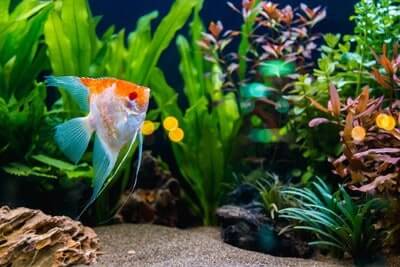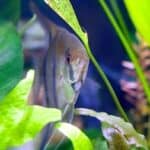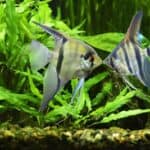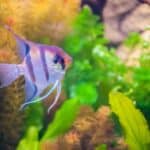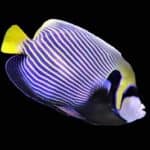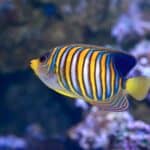Illnesses and nutritional deficiencies are common reasons why fish stop eating.
Fish need various foods, especially ones high in protein, to stay healthy and maintain their appetite.
Poor water conditions, stress, and unsuitable environmental factors are often responsible for the loss of appetite in fish. Aggressive fish and stress are other causes and can cause lasting damage.
Fish can starve to death if they physically can’t eat, so a solution must be immediately sought.
Why Is My Angelfish Not Eating?
Fish are hard-wired to eat when they’re hungry.
Unfortunately, as mentioned, prolonged periods of not eating eventually cause angelfish to starve to death, so you identify a speedy resolution to preserve their lives.
If your fish stop eating, here are the most likely reasons:
Poor Water Conditions
Even though angelfish are tolerant of slight changes to the water, they can’t deal with sudden or significant surges in water quality.
Fluctuating chemical levels can cause the angelfish to stop eating before they die.
In particular, rising ammonia levels are a problem in fish tanks. While ammonia is found in most aquariums, it affects all fish negatively when elevated.
Harmful ammonia levels are caused by the following:
- New, uncycled tanks.
- Excess fish excrement.
- Over-stocked aquariums.
- Over-feeding.
According to the Global Agriculture Alliance, decomposing matter contributes to poor water conditions. This includes rotting food, dying plants, and dead fish.
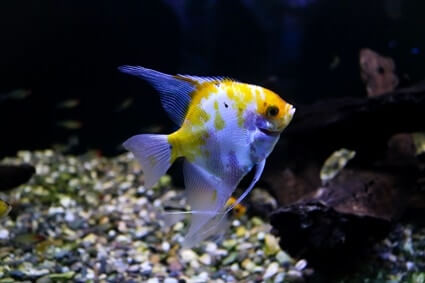
No Food Variety
Wild angelfish eat various foods. They’re omnivores, so they feast on live prey, like shrimp and other fish.
In most aquariums, owners only feed them flakes and pellets. Over time, they grow bored of consuming the same thing every day and stop eating.
The Journal of Applied Biological Sciences explains how angelfish prefer meat because they need high protein levels.
Incorporating worms and insects into an angelfish’s diet provides nutrition and mental enrichment.
Add vegetables, like zucchini, peas, and cucumber, to keep angelfish interested in food and encourage them to keep eating. Follow these basic rules:
- Feed 60% to 70% of staple food, like flakes and pellets.
- Feed 30% to 40% of other foods, like meat and vegetables.
Vitamin Deficiencies
Angelfish not fed a healthy, balanced diet are at risk of vitamin deficiencies. This commonly leads to a decrease in appetite.
If you feed your angelfish the right foods, they shouldn’t need liquid supplements. To encourage fish to start eating and ensure they’re healthy, supplement the water to increase their appetite.
You can get these from a pet store selling live fish or accessories.
Illness
Appetite loss is among the first signs of illness. Some conditions leave angelfish physically unable to eat due to the pain and discomfort.
The most common illnesses that affect angelfish include:
If you suspect the fish are sick, check for other symptoms, like poor swimming abilities, gasping at the water’s surface, and a change in appearance.
Quarantine it in a separate tank so they don’t make the other fish sick, particularly if they have parasites or bacterial infections because these are more likely to be contagious.
Environmental Changes
If the angelfish’s environment isn’t sufficient, they’ll lose their appetite.
Getting the parameters right in your tank is a complex process. You’re at risk of aquarium conditions souring if you don’t regularly test the water to check the chemical levels accurately.
Angelfish also lose their appetite because of:
- The incorrect temperature.
- Evaporation.
- Too much light or darkness.
- Insufficient tank size – i.e., it’s either too big or small.
- Low oxygen levels.
Angelfish are territorial and claim specific rocks and plants as their own.
Rearranging the environment is sometimes necessary to prevent aggressive, dominant fish from taking over, but it can confuse and stress fish, ruining their appetite.
Aggressive Fish
Unlike other cichlids, angelfish are relatively peaceful. They can be aggressive towards each other during mating season, but otherwise, they’re happy to live with other fish.
Due to their peaceful nature, they risk being bullied by larger, more dominant fish.
Similarly, if angelfish have to compete for food, the weaker ones in the tank will stop altogether. If there’s not enough food, they’ll chase each other to get the last traces of food.
Stress
Stress is a leading reason for appetite loss. Angelfish are easily stressed and become affected by:
- Too much activity within the tank.
- Overcrowding.
- Bad water conditions.
- Not enough hiding places.
If the angelfish only skips a meal, it’s not too much to worry about. If they refuse other meals, this situation requires your urgent attention.
To help increase the fish’s appetite, offer it new, unfamiliar meals, like live food to hunt or frozen food that you’ve thawed. Protein-rich flakes are also irresistible for angelfish.
Constipation
A lack of dietary fiber, poor-quality foods, and inadequate nutrition are the leading causes of constipation. It makes life feel uncomfortable for fish, so they lose the ability to eat.
Peas are a natural way to ease constipation. They’re high in fiber and flush out the system. Feed fish with constipation one boiled pea, removing as much of the outer shell as possible.
How Long Can Angelfish Survive Without Food?
Healthy adult angelfish can survive for about three days without food. Young angelfish don’t fare well and may only last a day or less.
Wild angelfish are used to going a few days without food because they hunt and forage to eat, and food doesn’t come around every day.
It’s not healthy for angelfish to go for too long without eating. If there’s a shortage of food, they’ll become aggressive and fight with each other, leading to injuries.
Due to starvation, angelfish become lethargic, sickly, and dim in color. In severe cases, angelfish may consume other fish in the tank or fry to survive.
How Much Food Do Angelfish Need?
Angelfish eat twice a day.
Monitor how much your fish eat within two minutes. Then, use this amount as their ideal portion size.
Juvenile angelfish need more nutrients to grow and develop. Feed them 3-4 times a day. At first, the fry needs more live food; later, it has flakes and pellets.
How Do You Know if You’re Not Feeding Your Fish Enough?
Angelfish hide when something’s wrong. If you can’t determine how much your fish eat as you feed them, you’ll need to look for signs. These include:
Weight Loss
Weight loss is a symptom of under-eating, but it can be hard to spot. Angelfish are slender, but they’re likely not to eat if they become too thin.
Taking pictures every day is one way to tell whether your fish has lost any weight.
That said, even well-fed angelfish are slender, so don’t rely on this method alone. When you’ve ascertained your fish aren’t eating, it could be too late.
Appearance Changes
Sickly, malnourished fish will experience changes in their appearance.
The fish’s diet plays a large part in their colors. If they don’t get the vitamins, minerals, and essential nutrients they need to stay healthy, their scales will suffer.
Nutritional deficiencies are responsible for turning fish white.
Some foods, like those containing shrimp meal, lutein, and Spirulina algae, are natural pigment enhancers that bring out the colors of the fish.
As soon as the fish stop eating, their colors may fade, making them look visibly sick.
Breathing Rapidly
Fish breathing rapidly have long-term stress or a health condition.
This suggests that your fish are suffocating, possibly due to low dissolved oxygen levels. In this case, fish aren’t interested in eating or are physically unable to do so.
Secluded
If your fish are secluding and isolating themselves from their tank mates, they’re likely sick. Parasites and bacterial infections are most likely to blame for this. By keeping itself secluded, the fish minimizes the risk of the disease or infection spreading throughout the tank.
You should quarantine any sick fish in a separate tank until you can cure it of its health condition. Eventually, you can encourage them to eat and regain their strength.
Hiding
Fish without an appetite are more likely to hide. You’ll find them hiding in the corner of the tank or among plants and decorative accessories.
There are many reasons why angelfish do this, including:
- Predatory fish.
- Aggressive companions.
- Poor water conditions.
- Hard water.
- Tank overcrowding.
- Sickness.
These are linked to appetite loss and refusal to eat.
Bloatedness
Bloating isn’t an obvious sign that a fish has stopped eating. However, it goes hand in hand with health conditions responsible for appetite loss.
Bloat is commonly the result of bacterial infections, protozoan infections, constipation, and dropsy.
Reducing stress and carrying out a water change is the first step in treating your fish. A vet will also recommend an appropriate treatment.
Food in the Tank
If you can’t determine whether the fish aren’t eating through their appearance or behavior, check for signs of uneaten food at the bottom of the tank.
Angelfish rarely save food for later. If they don’t eat when you first feed them, they won’t eat. If you don’t remove the food when you see it, it’ll rot and raise the tank’s ammonia to harmful levels.
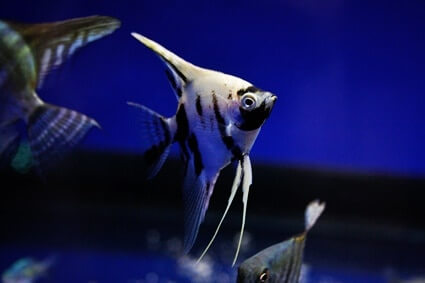
How Do I Get My Fish To Eat?
If the angelfish stop eating, you must make conditions in the aquarium more suitable. These include:
Remove Stressors
Remove all stressors from the tank, including chemicals, such as ammonia and nitrites, decaying plants and food, and controlling aggressive fish.
If there aren’t enough plants in the tank providing hiding spots, add more plants or decorative features.
Vary the Diet
If you’ve been feeding fish the same food for a while, try to vary the diet and see how well they respond.
You may find that a simple switch is all the fish need. If they respond favorably, swap their food out several times weekly to keep them interested.
Swap between frozen and fresh foods, as this will offer a wider variety of textures.
Provide live foods for your fish to hunt. This offers optimum nutrition and mental stimulation, reducing stress levels.
Right Amount
Under or over-feeding fish means that some fish will be inadequately fed. As a result, the fish haven’t chosen not to eat but can’t gain access to food.
To ensure all fish have a fair chance, only offer the fish food they can eat in two minutes.
If they eat more quickly, you haven’t fed them enough. If they eat everything sooner, you’re not providing them enough. If there’s food left in the tank, you’ve fed them too much.
Reset the Territory
If you have a dominant angelfish that stresses the weaker fish and prevents them from eating, reset the territory. This involves moving the plants and decorative features to new places in the tank.
Sometimes, it helps to reset the boundaries so the weaker fish can find territory. If conditions worsen, move some items back to where they originally were.

